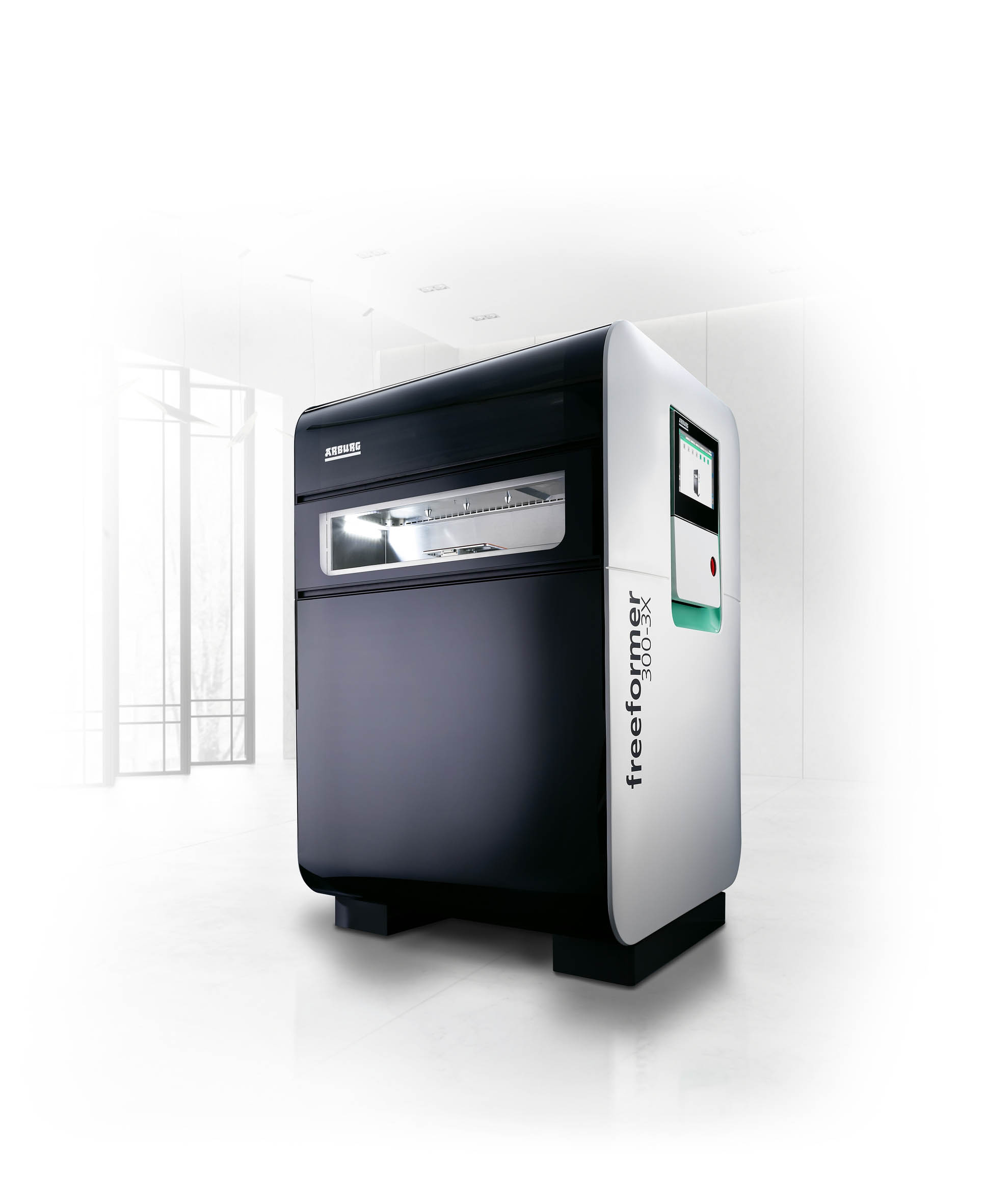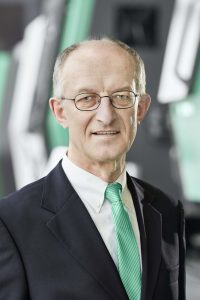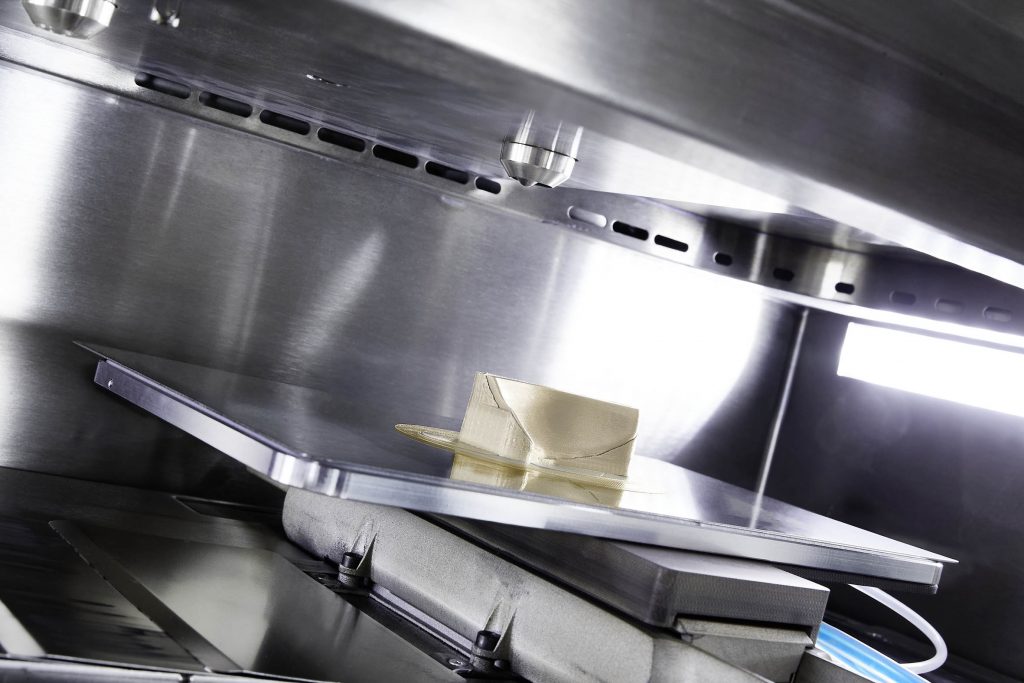
Lossburg, 13/4/2022
rapid + tct 2022, North America’s largest additive manufacturing event, will take place in Detroit, USA, from 17 to 19 May as a hybrid event. Arburg will be there: Two Freeformer 300-3X models will be on show at the exhibition stand (no. 2108): a standard system and a machine for processing high-temperature materials. Another highlight will be the presentation of the “ProcessLog” app, which can be used to track and document jobs in detail.

Friedrich Kanz, ARBURG USA
“We are expecting a lot of interest, as many companies in North America are developing additive ideas and are doing so in a fast and highly innovative way,” says Friedrich Kanz, Managing Director of Arburg Inc. “This makes the market extremely dynamic – which is perfect for our APF process and Freeformers.”
The free choice of materials from plastics, as also used in injection moulding, has emerged as one of the decisive advantages of Arburg Plastic Freeforming. In addition, the open system allows the properties of the additively manufactured parts to be specifically adapted.
Freeformer: Ideal for high-end requirements
Arburg’s presence at rapid + tct 2022 is intended to further expand its position, particularly in the aerospace, automotive, medical, and consumer goods industries. The focus in Detroit will be on high-temperature applications, such as with the materials ULTEM or PEEK, the processing of flexible materials, polypropylene parts, hard/soft combinations, and process monitoring with the “ProcessLog” app. With its partner OTEC, Arburg will show how the additively manufactured parts achieve surface qualities comparable to those of injection moulded parts through post-processing, such as vibratory finishing and barrel tumbling.

A high-temperature Freeformer 300-3X can process PEEK, for example, into individualised skull implants, including support material.
Safe processing of high-temperature materials
The Freeformer 300-3X can process high-temperature materials such as ULTEM 9085, which is a permanently flame-retardant and low-smoke material suitable for aerospace applications, as well as biocompatible, resorbable, sterilisable and FDA-approved original materials. At rapid + tct 2022, the high-temperature Freeformer, whose build chamber can be heated to 200 degrees Celsius, will process a medically approved PEEK granulate.
Optimised temperature management provides the necessary cooling, especially for the axis drives, which very precisely position the part carrier along the x, y and z axes. The Freeformer can currently achieve strengths of up to 95 percent when processing this material in the x and y directions.
With just a few minor modifications, the system is also suitable for use in clean rooms. Items that are clean room compatible, implantable, biocompatible, elastic, lightweight, stable, or conductive can be produced with ease.
ProcessLog: Job tracking and documentation
The APF process is also of particular interest in relation to the practical use of products in safety-relevant areas, because the process quality can be reliably documented and each part can be clearly traced. All Freeformers can be networked as standard via an IIoT gateway – for example with the “arburgXworld” customer portal.
The specially developed “ProcessLog” app allows a wide range of process and build job data for APF parts to be displayed in clear graphical form, documented, and traced on a part-specific basis. The recorded process data can thus be viewed over the complete build time with detailed information on material pressure, screw position, droplet frequency and discharge rate.
All-inclusive package: High-tech machines and know-how
The Freeformer is employed in the medical technology, aerospace and automotive industries as well as in research and development. “Even in cases where biocompatible, sterilisable or implantable materials are used, for example in the clean room, we are incredibly well positioned,” says Friedrich Kanz, summarising the prospects of the APF process in the US and Canada. The ease of use of the machines, the high quality and functionality of the parts and, last but not least, a solid competitive edge when it comes to knowledge of industrial additive manufacturing are also factors. The North American market also benefits from both local and remote service, process monitoring offerings, and support for customer orders and for processing customer-specific materials. It is precisely this know-how across the entire value chain that helps Arburg customers produce to a high standard right from the start, even in additive manufacturing.
About Arburg
German family-owned company Arburg is one of the world’s leading manufacturers of plastic processing machines. Its product portfolio encompasses Allrounder injection moulding machines with clamping forces of between 125 and 6,500 kN, the Freeformer for industrial additive manufacturing and robotic systems, customer and industry-specific turnkey solutions and further peripheral equipment.
An international sales and service network ensures first-class customer support at a local level: Arburg has its own organisations at 35 locations in 26 different countries and, together with its trading partners, is represented in more than 100 countries. Its machines are produced exclusively at the company’s German headquarters in Lossburg. Of a total of roughly 3,400 employees, around 2,850 work in Germany. About 550 further employees work in Arburg’s organisations around the world. Arburg has triple certification, in accordance with ISO 9001 (quality), ISO 14001 (environment) and ISO 50001 (energy).
Further information about Arburg can be found at www.arburg.com